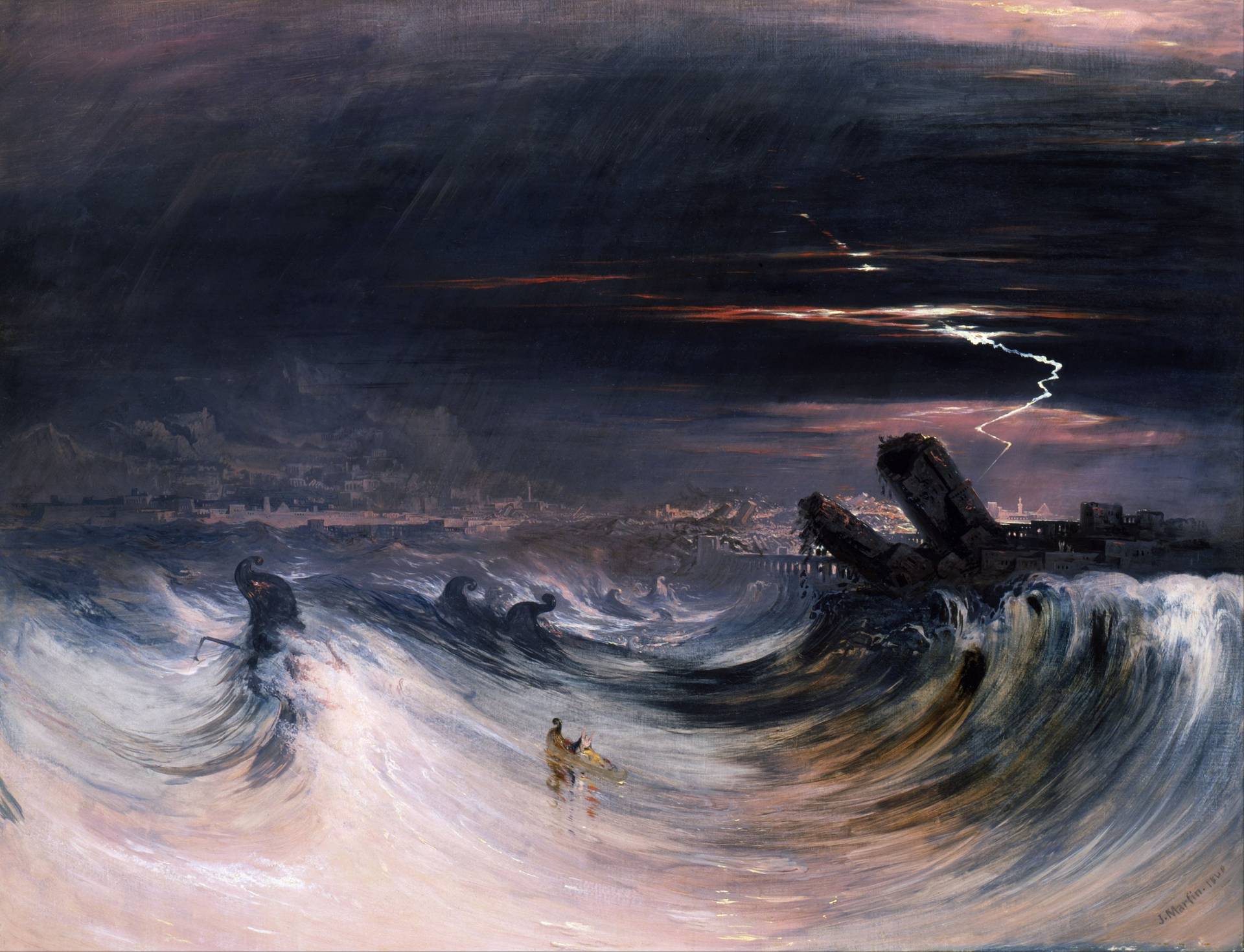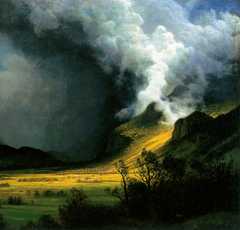
The Sublime: Edmund Burke on the Feeling Thunderstorms Give You
Have you ever felt a thrill during a thunderstorm? Awe before a dark, looming mountain range? Then you have experienced what philosopher Edmund Burke calls the sublime…

You’re home at night, when suddenly the sub-bass boom of a thunderclap splits the atmosphere in two. You rush to your window as rain begins to cascade down from the darkness above, and trees tremble and bend in the billowing wind. Water hammers against the glass, a flash of lightning illuminates the world in a blinding whiteness, before another eardrum-shattering cacophony of sound accompanies the plunge into a deeper darkness…
Safe inside your warm home, you look out upon the immensity and power of the storm with a kind of excited, terrified glee.
It’s the same sort of feeling you might have when looking out at a raging ocean, or standing at the foot of an enormous waterfall, or when, high in mist-filled mountains, you glimpse yet higher peaks towering above you, disappearing beyond the clouds…
If you’ve ever felt the delightful mix of exhilaration, awe, and fear such moments produce, then you’ve experienced what 18th-century philosopher Edmund Burke calls the sublime.
What is the sublime?
The sublime for Burke is an aesthetic experience that occurs when we encounter phenomena that, due to their immensity or raw power, overwhelm and astonish our senses.
In his (concisely titled) 1757 treatise, A Philosophical Enquiry into the Origin of Our Ideas of the Sublime and Beautiful, Burke writes:
The passion caused by the great and sublime in nature, when those causes operate most powerfully, is astonishment; and astonishment is that state of the soul, in which all its motions are suspended, with some degree of horror. In this case the mind is so entirely filled with its object, that it cannot entertain any other, nor by consequence reason on that object which employs it. Hence arises the great power of the sublime, that, far from being produced by them, it anticipates our reasonings, and hurries us on by an irresistible force. Astonishment, as I have said, is the effect of the sublime in its highest degree; the inferior effects are admiration, reverence, and respect.
The sublime produces an experience beyond mere beauty
Burke thinks the sublime can rouse our “strongest passion”, holding a transformative power that distinguishes it from mere beauty.
Beauty, Burke writes, typically involves small, delicate, pleasure-inducing phenomena — an orchid, a curved china pot.
The sublime, by contrast, arises from things vast, powerful, threatening — things that could do us real harm.
Crucially, however, while it involves dangerous things, the sublime “should have no idea of danger connected with it.”
In other words, there should be no imminent danger to us — the thrill of the sublime arises when abstract terror occurs within the comfort of personal safety.
So: watching the raging sea from the peace of the shoreline, rather than being thrown among the waves; feeling the relentless enormity and secrecy of the cosmos during a total eclipse, while safely inside Earth’s atmosphere; being reminded of our tiny precarious fragility, without actually having it crushed…
In one concise email each Sunday, I break down a famous idea from philosophy. You get the distillation straight to your inbox:
💭 One short philosophical email each Sunday. Unsubscribe any time.
As Burke writes:
if the pain is not carried to violence, and the terror is not conversant about the present destruction of the person, as these emotions clear the parts, whether fine or gross, of a dangerous and troublesome incumbrance, they are capable of producing delight; not pleasure, but a sort of delightful horror, a sort of tranquility tinged with terror; which, as it belongs to self-preservation, is one of the strongest of all the passions.
Indeed, unlike beauty, the sublime activates something deep in us, a “violent emotion of the nerves”, stemming from a primal need for survival.
Confronted by mind-defying power, shaken out of our puny human complacency, dormant parts of our psyches get a workout — we feel alive.
This is why infinity itself — something of which we cannot “perceive the bounds” — is perhaps the strongest source of the sublime, Burke writes:
Infinity has a tendency to fill the mind with that sort of delightful horror, which is the most genuine effect, and truest test of the sublime.
The sublime’s influence on Romanticism
Perhaps unsurprisingly, the feeling captured by Burke’s concept of the sublime has been a central point of inspiration for poets, painters, and musicians over the centuries — and held particular importance for the artistic movement of Romanticism.
In an essay on the sublime, the Romantic poet William Wordsworth writes that
the mind [tries] to grasp at something towards which it can make approaches but which it is incapable of attaining.
Wordsworth evokes this fleeting brush with greatness — the intangibility of the sublime — in his 1798 poem, Lines Written a Few Miles above Tintern Abbey:
Of aspect more sublime; that blessed mood,
In which the burden of the mystery
In which the heavy and weary weight
Of all this unintelligible world,
Is lightened
Have you experienced the sublime?
- Does the feeling articulated by Burke resonate with you? If so, what’s caused you to experience it previously?
- Do you think Burke accurately captures the sublime? Does his distinction with ‘mere beauty’ ring true?
- What are your favorite depictions of the sublime in art, literature, and music?
Learn more about philosophy and share your view
If you enjoy philosophy and philosophical discussion, you might like my free Sunday breakdown. I distill one piece of wisdom from philosophy each week; you get the summary delivered straight to your email inbox, and are invited to share your view. Consider joining 11,500+ subscribers and signing up below:

From the Buddha to Nietzsche: join 11,500+ subscribers enjoying my free Sunday Breakdown
In one concise email each Sunday, I break down a famous idea from philosophy. You get the distillation straight to your inbox.
💭 One short philosophical email each Sunday. Unsubscribe any time.
About the Author

Get one mind-opening philosophical idea distilled to your inbox every Sunday (free)

From the Buddha to Nietzsche: join 11,500+ subscribers enjoying a nugget of profundity from the great philosophers every Sunday:
★★★★★ (50+ reviews for Philosophy Break). Unsubscribe any time.

Take Another Break
Each break takes only a few minutes to read, and is crafted to expand your mind and spark your philosophical curiosity.





